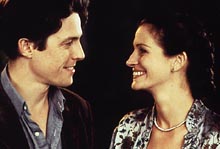
Anna Scott (Julia Roberts) in Notting Hill is the world’s most famous movie star, but something is missing from her life. The fame game has left a void in her celluloid soul, and the gent she elects to fill it is a stammering travel-bookstore owner, William Thacker (Hugh Grant), who appears to love her for herself and not her celebrity. In other words, what we have here is another self-congratulatory play-it-both-ways Hollywood romance: William is saluted for having the proper values while, at the same time, we’re encouraged to lap up the luxuries of stardom.
In London to promote her latest movie, a sci-fi epic called Helix, Anna first meets William at his Notting Hill store when he interrupts a sales pitch to deter a shoplifter; later, he accidentally bumps into her on the street and drenches her in orange juice, which brings her into his nearby apartment for a freshen-up and a surprise kiss. (She smooches him as she exits; he smiles wanly.) The plotting throughout the movie, courtesy of screenwriter Richard Curtis, remains at this clunky level, although the clunkiness may be intentional – as a way to point up the love affair’s wacky improbability.
But there’s a difference between improbable and untenable. These two, despite what we’re meant to believe, are not exactly lovers for the ages. The best they do for each other is demonstrate a kind of pronounced affection, and so it’s tough to get worked up about their voided souls. William, recently divorced, shares his flat with a Welsh layabout named Spike (a scene-stealing Rhys Ifans), who trots about in his day-old undies and wears T-shirts with messages like FANCY A FART? He’s certainly got more inner life than his roomie, with his aggregation of tics and blinks and winks, and, for a while, one holds out the faint hope that Spike will be the guy to land Anna. (The wanker certainly wants to.) But this, after all, is a romantic comedy with “heart,” which means we have to go through the standard two-step about finding true love by finding your own true self.
In Anna’s case, her true self turns out to be connected to all the “real people” things we simple folk take for granted. During a dinner-party game hosted by William’s friends, in which the winner is the one who tells the most self-pitying tale, Anna triumphs. Her tale trumps even a woman permanently wheelchair-bound (Gina McKee) who laments that she can’t have kids. How does Anna do it? In measured tones, she tells the assemblage that she’s been dieting for a decade, that she’s had cosmetic surgery, that she’ll eventually lose her looks and be referred to as someone who used to be famous. After this recitation, the director Roger Michell holds the camera on her face for that extra beat that says feel her pain. Of course, earlier in the evening, Anna one-upped a guest by citing her standard acting fee – $15 million – but apparently money doesn’t mean much to her. Her sobby litany is meant to tenderize her glamour, but it comes across like royalty slumming with the help.
The movie-star-playing-a-movie-star-who-wants-to-be-a-real-person conceit also has an odd, chilling effect on Julia Roberts, whose appeal, overwhelmingly, is based on her seeming just like the rest of us – only more gorgeous and winning. By playing a diva unhappy with the trappings of stardom, she cancels out her attractiveness; we don’t want to see her bemoaning her success, we want her to be as delighted as we imagine we would be in her place. I mean, this is a fantasy, folks.
The movie makes it easy for Anna to be disengaged from her good fortune: She’s had a history of crumbum boyfriends (including one played, in a cameo, by Alec Baldwin); she’s hounded by paparazzi; she gets no particular pleasure from her craft. We see a clip from Helix that makes her look like just another high-priced Hollywood automaton. But what if we saw her in something where she really showed off her joy in acting – or whatever it is that makes Anna the world’s biggest movie star? Suppose William was attracted not just by her simple self but also by her abilities, her allure? Since he’s apparently all but ignorant of her movies, or anybody else’s, it’s easy for William to seem untainted by her fame. But isn’t it a cheat to set up the movie in this way – as if there were something inherently impure in the notion that we might be turned on by things like talent, power, and moolah?
The kicker, of course, is that William gets to have it all anyway. He gets the girl and he also gets to politely disdain the razzmatazz she represents. Even though most of their excursions together are all about her priorities and not his – he reads over her scripts with her and shows up at her press junkets and movie locations – he still pulls the heartstrings. In his own befuddled way, William’s a real smoothie: Waking up in bed with him, Anna complains about the way she looks and he answers, “You look lovelier than ever,” and the way he says it, it’s not just a line. William acts so “real” around Anna that he’s completely unreal. You want to tell him to take his lovely sincerity and stuff it.